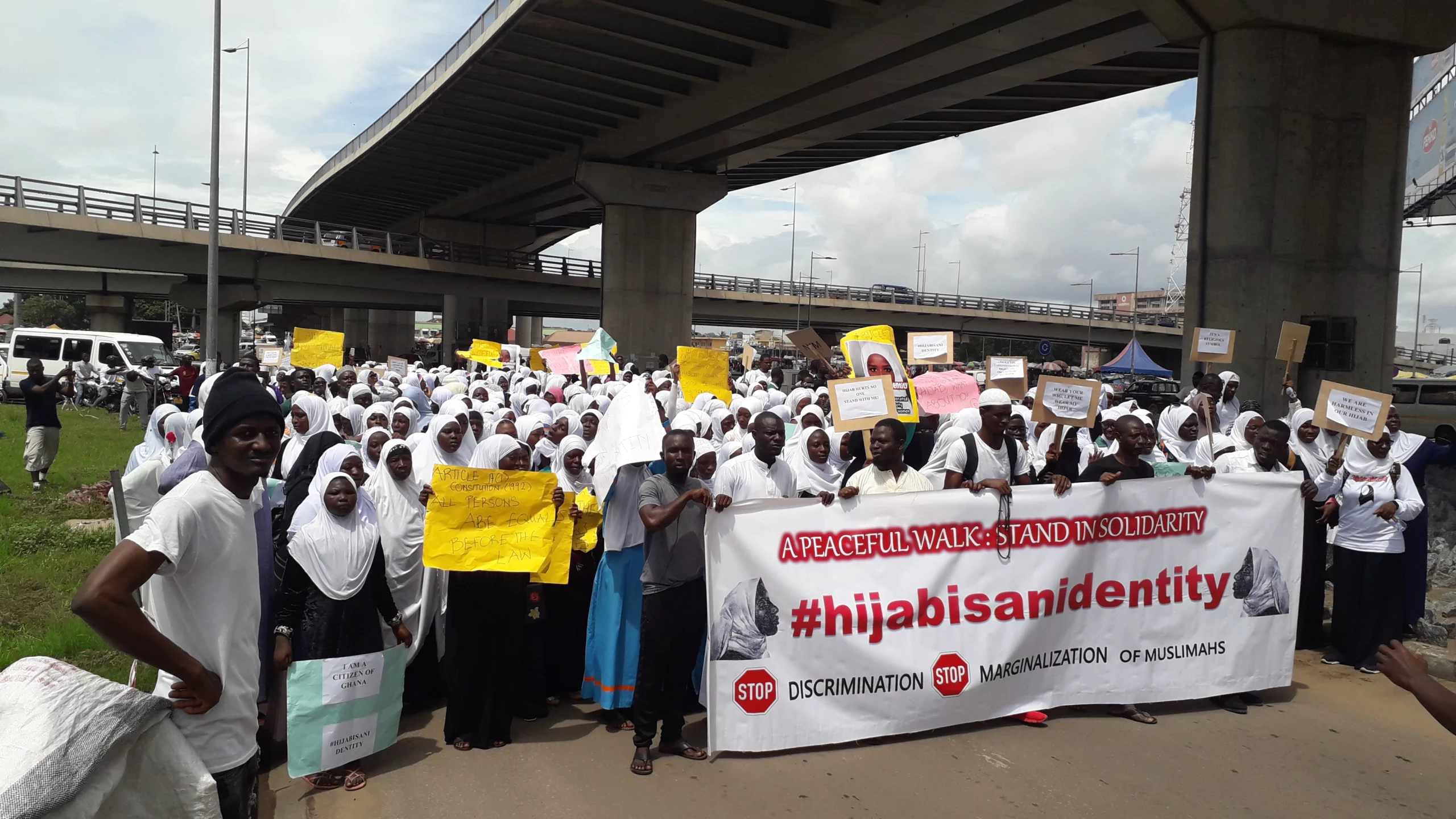The Hijab Struggle: a story of fathers pouring sand into ‘Gari’ of daughters

The least said, an act of fathers raining down on the parade of their daughters. Where from the dagger that thrust down right through the head of every young Ghanaian Muslim woman who wants to please her Maker, keep her identity, protect herself and seek a better life through education?
Just when Muslims in the country are dealing with ‘unfavourable’ comments about the Hijab from the then Supreme Court judge nominee, the utterance of the National Imam of the Ahlusunna Wal Jamaa could be described as the last straw that broke the camel’s back.
Think of the latter part of last year as the most uncompromising period of some brave Muslim women who defied the odds to make their voices heard by staging multiple walks across the capitals of some regions in October 2019.
After a series of meetings with various stakeholders such as the Muslim Caucus of Parliament, Office of the National Chief Imam and even the Ghana Police Service, organizers managed to bring together some like-minded people to support their call to create awareness on the need to allow Muslim women carry out their constitutionally mandated right of practising their religion which included their right to put on their veil (Hijab).
In Accra for instance, there was an attempt by the police to prevent the walk from taking place as it had been classified as a demonstration that would require police protection to be carried out. These setbacks never stopped the women from making the 2.9-kilometre walk in their hundreds.
Seven months down the line, the struggle to fight against the discrimination of young women who are often harassed in public spaces such as schools, health facilities and banking halls has been delved into a sucker punch that could induce an eternal coma to the spirit of our young women.
There had been talks of unseen hands and saboteurs who sought to undermine the hijab advocacy from within the Muslim circle.
Little did they know that hand that was supposed to give a pat on the back was the hand that would push them off the cliff.
The moment of truth came when his lordship and his entourage embarked on what many sceptics described as a damage control visit to top leaders of the Muslim community in Ghana.
By dint of ill luck, a supposedly private video of the Ahlusunna Imam making controversial remarks about wearing the hijab went viral. This beats imagination considering the fact that his sect is popularly known for upholding the hijab tradition.
In an interview conducted by a fellow Muslim from the team of the Justice, the imam, who appeared quite unprepared, was observed making some statements that ascribed the insistence on wearing hijab to a form of extremism.
The interviewer for some dubious reason based his question on an assumption that some young Muslim women feel obliged to quit school if not allowed to wear their hijab.
This ill-motive question sought to solicit a response that would downplay the significance of the hijab for the Muslimah.
It is baffling how the interviewer failed to admit that most of the chief advocates of the hijab are no dropouts and for that matter illiterates, contrary to what he made the imam believe. These are well-educated and accomplished women of reputable social standing.
They have for the most part of their academic lives compromised and endured the hardship of having to shave off their hair and expose their bodies to every Tom, Dick and Harry with the hope of excelling and changing the status quo for future generations.
Moreover, I am yet to personally come across any woman who dropped out of school because she could not wear her hijab.
Such an assumption was malicious, skewed and a disservice to the calibre of smart women who marched out onto the streets to promote the hijab.
Interestingly, among the people are those whose main challenge about the encounter between the Imam and the Judge was the fact that the Imam was not well covered to be captured on video.
The irony here then is, why does the state of one imam in an ordinary robe and uncovered hair upset us more than the state of many young women who are under constant pressure to uncover their hair?
Which is considered more sacred in Islam? The hair of a male imam or that of young females who only want to have an education that will enable them to serve their religion better as well as improve their personal and social lives.
I vividly recall as a boy, the mantra of Muslims especially the Ahlusunna sect needing to have their own morgues and cemetery partly due to the perception of how Muslim bodies were overly exposed and manhandled by non-muslim attendants.
In as much as the mantra dissipated with the coming years due to a myriad of reasons, the value placed on the dead has never changed.
The question to ask then is, under what circumstance would a religion that places so much significance on covering and taking care of lifeless bodies undermine the covering of the living for the pursuit of the dunya (secular education)?
Let’s assume the call for the right to wear hijab was out of order. Let us assume there are lots of Muslim women out there who are unwilling to pursue education due to their hard stance on not compromising their religious values.
Would that not be an indictment on the Muslim leadership on how they have failed the younger generation in creating the needed environment to ‘nurture, nourish and sustain’ the younger generation on the part of the deen?
With the remarks by the Ahlusunna Imam suggesting that the fight for the hijab is not the only good deed in the Quran; and neither has it been the most important deed for Muslim women in the country, it would appear as though the imam was downplaying the weight of a good deed.
And any believing Muslim knows how detrimental it could be to disregard a good deed no matter how little it is.
I am also tempted to believe that the imam is asking the vibrant Muslim youth of the country to redirect their exuberance and activism to demand accountability from Muslim leaders rather than the state.
Perhaps the time has come for the Muslim youth to demand more schools from their leaders as it will appear inexcusable for leaders of major sects in the country with an average of three or more decades at the helms of affairs to fail to pinpoint at least one Senior High School established in each region under their auspices.
Revenues from annual conventions, maulids (birthday celebration of the holy prophet) and any kind of funding received from local and international bodies should henceforth be dedicated to the construction of our own SHS.
It is time our leaders humbly consult the Ahmadiyya Muslim sect on how to build and manage Islamic schools.
At least they are our benchmark as they can boast of some of the finest Senior High Schools (SHS), among other public facilities that the nation can boast of.
Dear Muslim leaders, while we wait on you to build our schools, our Saturdays for Islamic studies (makaranta) have slipped through our fingers under the pretext of extra classes.
If wearing a hijab could be an act of extremism, wondering what refusing to attend Saturday classes in order to go to Makaranta could be termed as, especially when compromising on religious practice for secular education is the way to go.
Join our whatsapp channel for all the latest updates.
For news coverage, article publication, and advertisement, send an email to ghanaianminaret@gmail.com or reach us via whatsapp, telegram or phone call on +233266666773.

